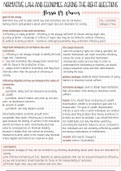Samenvatting
2021 - Empirical Legal Studies: articles summary
- Instelling
- Universiteit Van Amsterdam (UvA)
These notes are reading notes from week 1 until week 7 of the course Empirical Legal Studies, the second course of the minor Law&Economics. The notes are made in goodnotes and include quotes, graphs and all of the other important information from the readings.
[Meer zien]




